Classic vs. marble vs. French rolling pins: Which is best?
So many rolling pins, so little time.
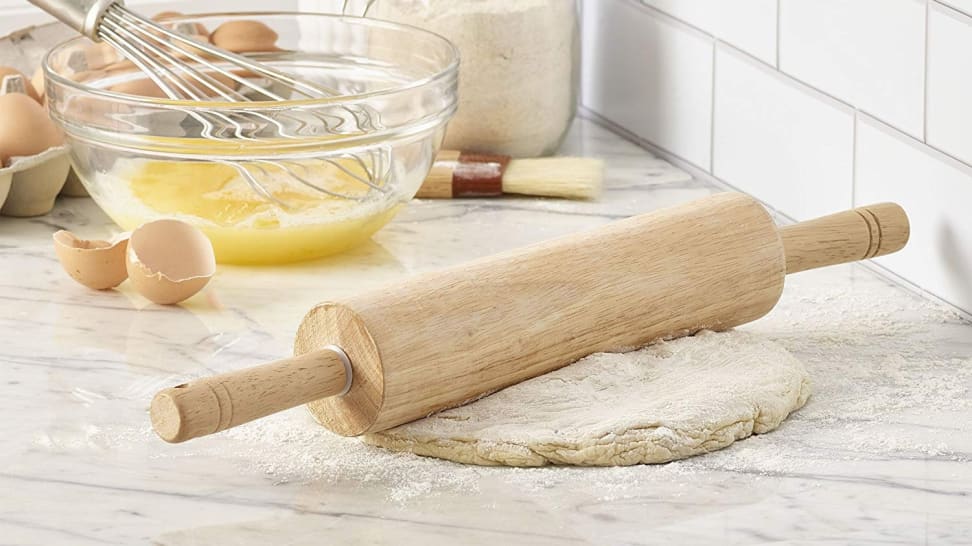 Credit:
Farberware
Credit:
Farberware
Products are chosen independently by our editors. Purchases made through our links may earn us a commission.
Every baker has a favorite rolling pin, whether it’s one they bought themselves or inherited from a family member. Even though rolling pins may seem like simple, straightforward kitchen tools, there are a variety of different kinds to choose from, some of which are better suited for specific purposes or experience levels.
That begs the question: Which rolling pin is right for you? Here are the rolling pin pros and cons you should know as you shop!
Classic wooden rolling pins
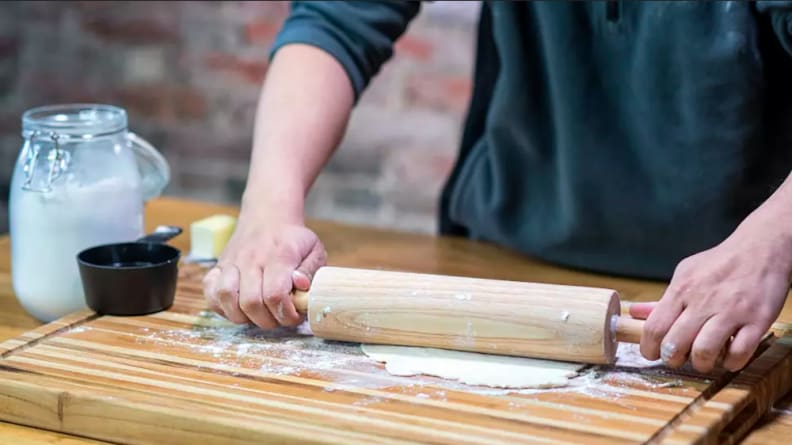
This is the style of rolling pin most people are familiar with.
Classic rolling pins are generally made from wood and feature a smooth, cylindrical roller and two easy-to-hold handles.
Pros:
- Ease of use: These models are the most popular for a reason—they're easy to handle and work well. As such, they're a great choice for new and recreational bakers.
- Even dough thickness: With a large flat roller, you can easily achieve equal thickness in your rolling.
-
Easy to clean: Wooden rollers take mere moments to clean with warm, soapy water.
Cons:
- Heavy: Depending on the model you get, a wooden roller can be fairly heavy, especially if handles are screwed in.
- Maintenance: As with most wooden kitchen tools, your rolling pin may need periodic maintenance—otherwise, it may not last as long as you'd like. If your roller starts to crack or get dry, rub it with mineral oil using a washcloth.
Good for:
Beginners and general use. These can be used for most all rolling tasks—pastry dough, pizza dough, cookie dough, etc.—but they aren’t as sophisticated as some other choices.
Marble rolling pins
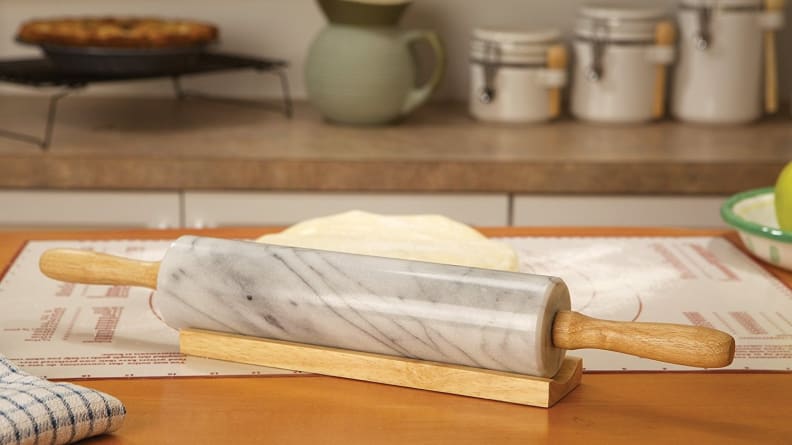
There's no denying marble rolling pins are beautiful.
Who doesn’t love the look of marble in the kitchen? Marble rolling pins operate similarly to classic wooden models, but the barrel is made from stone. Some products have wooden handles, while others are made completely from marble.
Pros:
- Appearance: There’s no denying the visual appeal of this roller. When bought with a base, it can be proudly displayed on your counter and double as kitchen decor.
- Easy to clean: Marble is durable, so it will be a breeze to clean dough from the surface.
Cons:
- Very heavy: Beauty comes with a price. Marble is essentially rock, so this roller is much heavier than others. This makes it more uncomfortable to wield, and you may find it's hard to get an accurate feel for dough thickness.
- Clingy: You’ll want to have lots of flour handy when rolling with marble. Dough tends to cling to it, so be sure to coat your pin with flour before you start and periodically re-coat the marble surface as you roll your dough.
- Conductive material: Because marble has excellent heat conductivity, it cools down and heats up very quickly, which can cause problems when you're handling dough. As you roll the pin back and forth on chilled dough, the marble will transfer the heat from your hands to the dough, which is generally the opposite of what you want happening.
Good for:
Dough that needs a heavy hand, such as over-chilled dough. Use the weight of the marble to woman-handle it into submission and make it pliable again.
French rolling pins
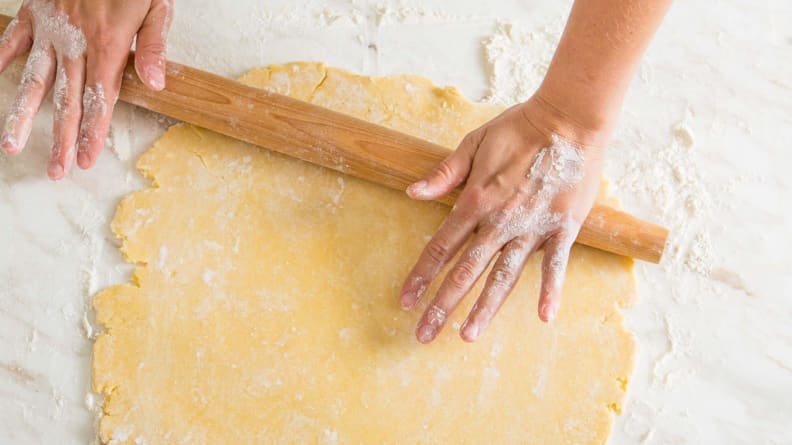
French rolling pins don't have handles.
French rolling pins come in different materials, but you’ll most often find them made of wood. This style foregoes the handles found on classic rollers—it's essentially just a long stick. The middle is thick, but the ends tapers off, mimicking conventional handles without breaking the consistency of the roller.
Pros:
- No handles! No handles, no problems. (Well, some problems—we’ll get to those—but mostly no problems.) Handles screwed into a conventional roller can get sweaty, loose or rusty over time. Plus, removing them makes for a more seamless rolling experience.
- Easy to clean: French rolling pins are even easier to clean than classic rollers, as there are no nooks where dough and flour can hide.
-
Baker’s choice: Professional bakers tend to gravitate toward French rolling pins, especially when working with pastry dough.
Cons:
- Learning curve: It takes time to learn how to use this type of roller. Since it has tapered edges, it’s easy to accidentally roll with a curved edge or misjudge where your roller ends and your handle starts. Don't expect to be a pro right off the rip.
-
Dough inconsistencies: If you’re not using it properly, your French rolling pin may leave thick spots in one area and thin spots in another.
Good for:
Pastry dough and experienced bakers. Or anyone who love a challenge!
Rolling dowels
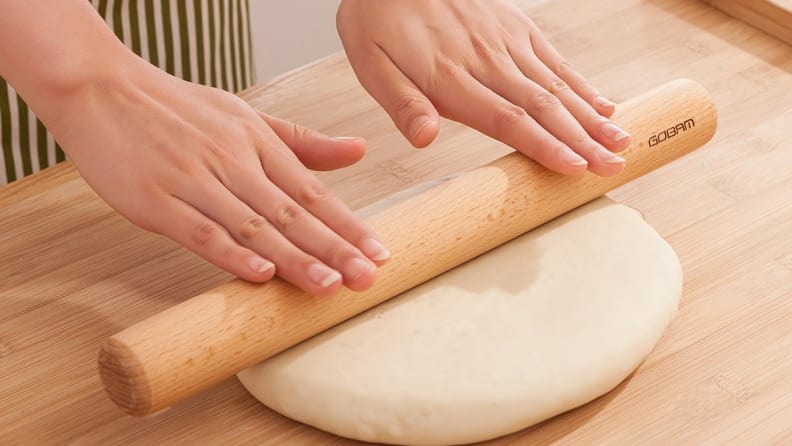
Similar to French rolling pins, rolling dowels don't have handles.
It's simple, consistent and effective. Rolling dowels are nothing special to behold—they're just long, smooth cylinders—but they often deliver superior performance and unbelievably easy cleaning. As such, it's really no surprise this model came out on top when we tested the best rolling pins.
Pros:
- Even dough: Since the roller is all one material and size, you get even results every time. Minimal pressure, minimal maneuvering—it’s every baker’s dream.
- Perfect weight: Dowels aren’t too light or heavy, meaning they apply just the right amount of pressure to the dough with each roll.
- Full control: Unlike other rollers where you may be worrying about handles being too loose or tapered edges creeping into areas they shouldn’t, rolling dowels give you full control over the pin.
- Easy to clean: This style of rolling pin is one of the easiest to clean, as the simple design has no nooks.
Cons:
- Bulky: Since it’s essentially just a very large kitchen stick, rolling dowels can look bulkier than other rollers.
- Storage: Dowels can be quite long, so make sure you set aside a special place in your kitchen for this roller to call home.
Good for:
Pizza dough—and everything else. Dowel rolling pins work well on all types of dough, but for those of us that particularly struggle with getting that perfect consistency on pizza, this is the roller of choice.
Engraved rolling pins
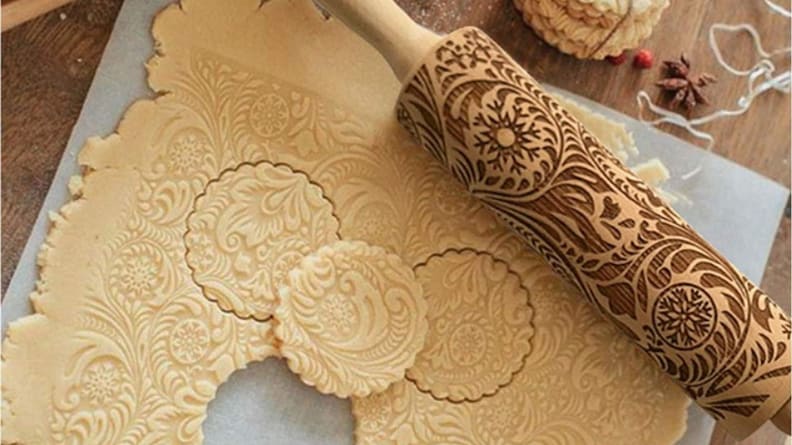
Engraved rolling pins create patterns on your dough.
Rolling pins that have been embedded with pretty designs are a great gift for bakers who already own a standard rolling pin, but at the end of the day, they’re not useful for conventional rolling tasks.
Pros:
- Design: Engraved pins can make cool designs on cookies.
- Appearance: If your engraved rolling pin has a festive design, it can be part of your kitchen decor.
Cons:
- Everything else: You'll need a regular rolling pin to flatten out your dough, and you only have one chance to roll an engraved pin—if you go back and forth, the pattern will be ruined. Plus, it's a pain to clean out all those little crevices.
Good for:
Novelty and/or kitchen decoration, honestly. You can also give it as a gift to the baker who has it all.
With the right rolling pin in your kitchen, it will be a quick and easy task to make sugar cookies, pizza, pie dough and more. Just be sure to take your experience level and primary goals into account as you choose between classic, French, marble and dowel rolling pins.


